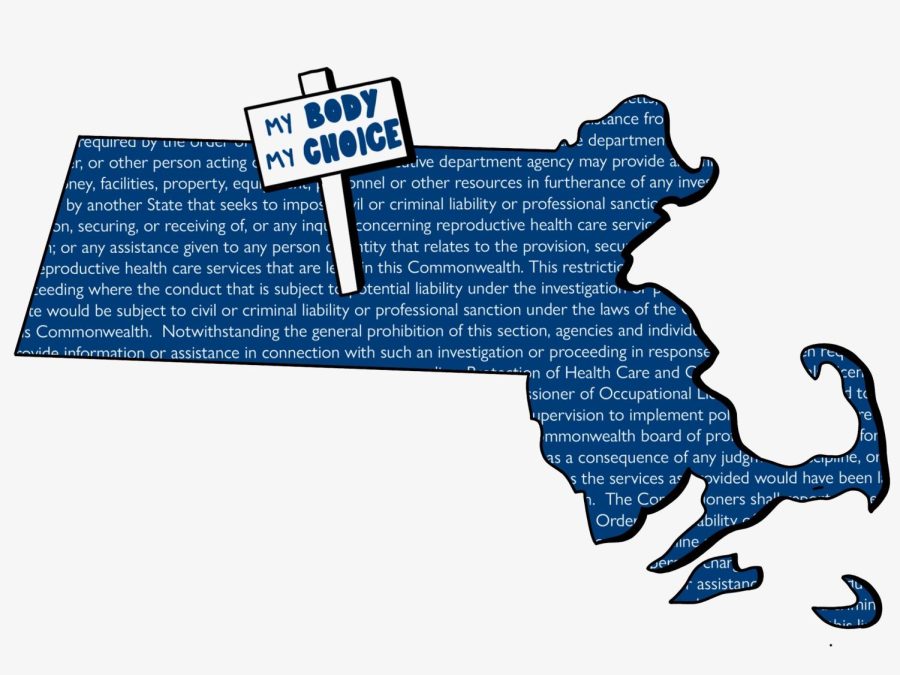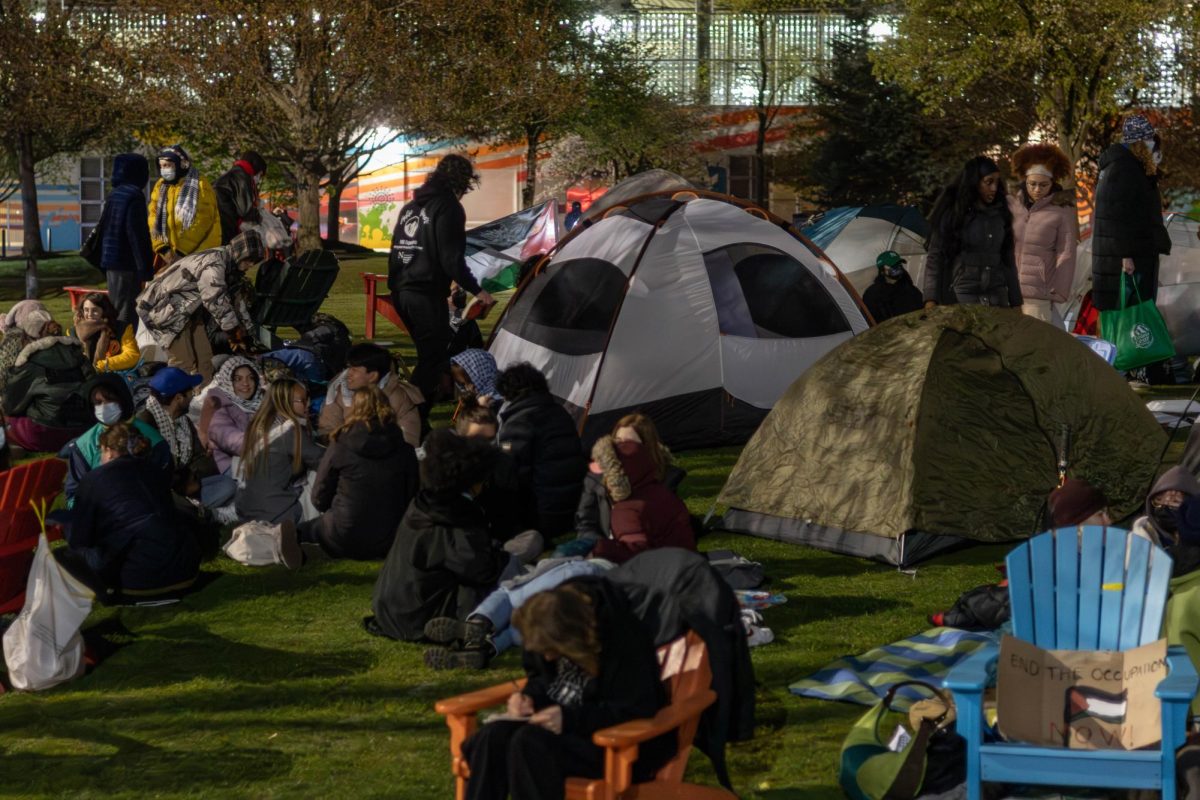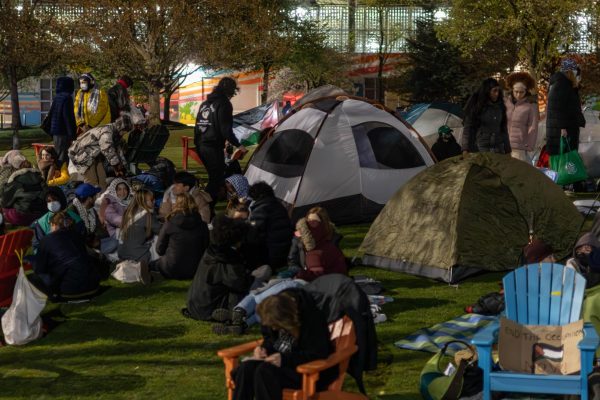Local, national reproductive rights organizations continue fight after Roe v. Wade reversal
Text taken from Executive Order No. 600: Protecting Access to Reproductive Health Care Services in the Commonwealth.
October 27, 2022
On June 24, the Supreme Court overturned the longstanding right to abortion secured by Roe v. Wade in Dobbs v. Jackson Women’s Health Organization. In the landmark decision, the Supreme Court determined the United States Constitution did not guarantee the right to an abortion, inciting nationwide outrage. Individuals across the country have since taken to the streets and social media in protest of the decision.
While abortion remains legal in Massachsetts, for some reproductive justice agencies in the state, the decision is a reminder of why their work is important.
“What the Dobbs decision really did was re-emphasize the need for access to information and education and healthcare about contraceptives and abortion,” said Saniya Ghanoui, the program director of Our Bodies Ourselves Today.
Our Bodies Ourselves Today is a digital platform based in Boston devoted to spreading information about the health, sexuality and wellbeing of women, girls and gender-expansive people, including information about reproductive justice. Launched in September, the platform was released as a collaboration between Suffolk University’s Center for Women’s Health and Human Rights and the founders of Our Bodies Ourselves, a non-profit organization.
“Our Bodies, Ourselves,” is also a book first published by the New England Free Press in collaboration with the Doctors Group in 1970.The Doctors Group formed after a group of women from the Boston area were frustrated by their lack of knowledge of their own bodies and reproductive health. They first published a book titled “Women and Their Bodies,” and later renamed it to “Our Bodies, Ourselves.” There have been nine editions released since the founding, with the most recent released in 2011. The book has also been translated to over 30 languages.
“In response to Dobbs, we consciously added resources [people] would need immediately to assist in reproductive health,” Ghanoui said.
Such resources include a links page to information about abortion and contraceptives in the area, like how to find an abortion provider or recent changes to abortion laws. Our Bodies Ourselves Today holds a strict privacy policy and does not collect any identifying information from users, which guarantees anonymity in receiving any information they may need about accessing abortion or other contraceptives.
Along with existing efforts by pro-choice groups, the Dobbs case sparked the founding of new organizations. Rise Up 4 Abortion Rights, a national organization, formed in January 2022 amid uncertainties surrounding reproductive rights when the Dobbs case was initially brought up to the Supreme Court. With the mission of “abortion on demand and without apology,” the organization initially formed in an effort to prevent the Supreme Court from deciding to overturn Roe v. Wade.
Kathy Lawrence, a Boston organizer for Rise Up 4 Abortion Rights, said the organization takes inspiration from similar movements in Latin America, where protesters raise a green bandana in opposition to the criminalization of abortion.
While many are simply encouraging voters to “join the blue wave” and vote Democrat, Lawrence said this is not enough.
“We feel like we really need to bring people out into the streets. That’s how the right to abortion was won in the first place, and that’s how any sort of key human right in this country has been won. Not just by voting, but by taking to the streets,” Lawrence said.
As a national organization, the operations of Rise Up 4 Abortion Rights in blue states such as Massachusetts are similar to those in more conservative areas.
“Even though abortion is available in Massachusetts right now, it’s not like it’s absolute. … If one state is under attack, then we’re all under attack,” Lawrence said.
For this reason, the organization has continued to fight for reproductive justice, despite being unsuccessful in its initial goal of preventing Roe v. Wade from being overturned. Organizers across the country have also planned a nationwide day of action Dec. 1. The day will entail a series of protests outside of courthouses in support of nationwide legalization of abortion.
Meanwhile, at Northeastern, student organizations have responded with increased action and conversations surrounding reproductive justice. Northeastern Sexual Health Advocacy, Resources and Education, or NU SHARE, is a club that promotes reproductive justice and healthcare on campus and works to destigmatize conversations around sex by providing comprehensive sex education. Following the Dobbs decision, the organization has engaged in more conversations about abortion and the stigmas that surround it, especially in more conservative states and countries.
“We know Massachusetts people have more access to healthcare, especially abortions, but our student body is from all over the world and all over the country, so it’s really important to have these conversations,” said Finn Seifert, a second-year human services major and treasurer of SHARE.
In addition to conversations surrounding abortion, SHARE also unveiled a new emergency contraceptive vending machine located in Marino Recreation Center Oct. 25. The machine, which is located below the first floor staircase, is a collaboration between SHARE and University Health and Counseling Services. It contains free sexual health products and generic Plan B pills for a fraction of their typical cost, as well as menstrual products and pain relievers.
“We wanted to create something that was at a reduced cost to access emergency contraceptives that everyone in the community could access,” Seifert said.
The emergency contraceptive pill in the machine costs $7, which can cost upwards of $40 at drugstores. In addition to supporting reproductive healthcare and reproductive rights, SHARE provides a community for students interested in sex education and advocacy.
“A big part of SHARE is our weekly meetings where we come together to talk about any topic relating to sexual health, and that builds a community,” Seifert said.
These organizations share a common sentiment about the fight for reproductive justice; it is far from over. Whether it manifests in deeper conversations, protests or calls for action, the organizations have all continued their advocacy for reproductive justice in the wake of Dobbs v. Jackson Women’s Health Organization.


















